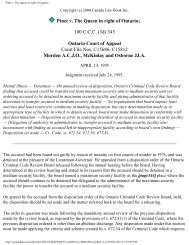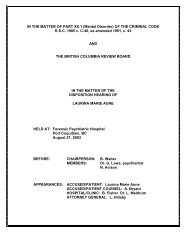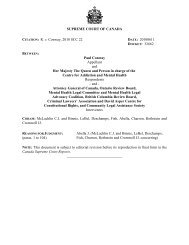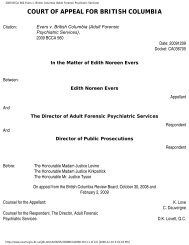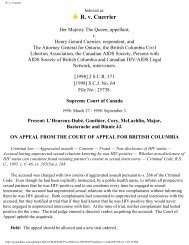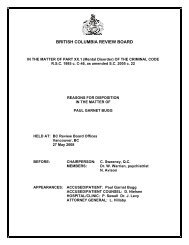R. v. Wong - Reasons for Judgment - British Columbia Review Board
R. v. Wong - Reasons for Judgment - British Columbia Review Board
R. v. Wong - Reasons for Judgment - British Columbia Review Board
Create successful ePaper yourself
Turn your PDF publications into a flip-book with our unique Google optimized e-Paper software.
R. v. <strong>Wong</strong> - <strong>Reasons</strong> <strong>for</strong> <strong>Judgment</strong><br />
Citation: R. v. <strong>Wong</strong> Date: 20060710<br />
2006 BCPC 0322 File No: B41799-2-D<br />
Registry:<br />
Vancouver<br />
IN THE PROVINCIAL COURT OF BRITISH COLUMBIA<br />
REGINA<br />
v.<br />
LARRY WONG<br />
REASONS FOR JUDGMENT<br />
OF THE<br />
HONOURABLE JUDGE C. J. BRUCE<br />
Counsel <strong>for</strong> the Crown:<br />
R. Fahrni<br />
Counsel <strong>for</strong> the Defendant:<br />
J. Bahen<br />
Place of Hearing:<br />
Vancouver, B.C.<br />
Date of Hearing: June 26, 2006<br />
Date of <strong>Judgment</strong>: July 10, 2006<br />
INTRODUCTION<br />
[1] This is an application by the defendant <strong>for</strong> a stay of proceedings pursuant to Section 672.851 of the Criminal<br />
Code in respect of a charge of attempted murder and aggravated assault arising out of events that occurred in<br />
November 1991. On December 3, 1991 the defendant was found unfit to stand trial on these charges as a result of a<br />
mental disorder and since that date has been held in the custody of the Forensic Psychiatric Institute at the pleasure<br />
of the Lieutenant Governor.<br />
[2] Section 672.851 came into <strong>for</strong>ce on June 30, 2005 in response to the judgment of the Supreme Court of<br />
Canada in Regina v. Demers (2004) 185 C.C.C. (3d) 257. In that case the Court recognized the inequity of<br />
subjecting a person found to be permanently unfit to stand trial to the continued jurisdiction of the criminal justice<br />
http://www.provincialcourt.bc.ca/judgments/pc/2006/03/p06_0322.htm (1 of 10)2007-08-23 11:31:05 AM
R. v. <strong>Wong</strong> - <strong>Reasons</strong> <strong>for</strong> <strong>Judgment</strong><br />
system where the person was no longer a significant risk to the safety of the public. In such circumstances, the Court<br />
may exercise its jurisdiction to stay the underlying charges to prevent the accused from being subjected to the<br />
prospect of a trial <strong>for</strong> an indefinite period.<br />
[3] The case at hand arose out of a recommendation from the <strong>British</strong> <strong>Columbia</strong> <strong>Review</strong> <strong>Board</strong> pursuant to Section<br />
672.851(1) that the Court hold an inquiry into the defendant’s circumstances to determine if a stay of proceedings<br />
should be granted. Pursuant to Section 672.851(1) a recommendation to the Court may only be made where the<br />
<strong>Review</strong> <strong>Board</strong> determines the accused remains unfit to stand trial and is not likely to ever become fit, and the accused<br />
does not pose a significant threat to the safety of the public.<br />
[4] Upon receipt of the <strong>Review</strong> <strong>Board</strong>’s recommendation, Section 672.851(7) sets out the tests to be applied by<br />
the Court in determining whether a stay of proceedings is appropriate. These tests are:<br />
a. on the basis of clear in<strong>for</strong>mation that the accused remains unfit to stand trial and is not likely to ever<br />
become fit to stand trial;<br />
b. the accused does not pose a significant threat to the safety of the public; and<br />
c. that a stay is in the interests of the proper administration of justice.<br />
[5] When assessing the final test; that is, the interests of the proper administration of justice, Section 672.851(8)<br />
dictates that the Court consider the following factors:<br />
a. the nature and seriousness of the alleged offence;<br />
b. the salutary and deleterious effects of the order <strong>for</strong> a stay of proceedings, including any effect on public<br />
confidence in the administration of justice;<br />
c. the time that has elapsed since the commission of the alleged offence and whether an inquiry<br />
has been held under s.672.33 to decide whether sufficient evidence can be adduced to put the accused<br />
on trial;<br />
d. any other factor the court considers relevant.<br />
[6] The Crown and Defence are in agreement that the defendant is unfit to stand trial and that it is unlikely he will<br />
ever become fit to stand trial. The issues in dispute are whether the defendant represents a significant threat to the<br />
safety of the public and whether a stay of proceedings is in the interests of the proper administration of justice.<br />
CHRONOLOGY OF EVENTS<br />
[7] On November 7, 1991 the defendant is alleged to have tried to murder his landlord (Wai Ping Chan) by<br />
stabbing him with a knife in the neck and chest area. The defendant is also charged with aggravated assault in regard<br />
his landlady (Yet Wah Chan) by stabbing her in the upper arm with the knife. Both the complainants were cleaning the<br />
defendant’s apartment in the Powell Rooms, located at 556 Powell Street in Vancouver, when they were allegedly<br />
attacked by the defendant who wielded a large cleaver. Wai Ping Chan spent about three weeks in hospital as a<br />
result of his injuries and Yet Wah Chan was in the hospital <strong>for</strong> four or five days.<br />
[8] The defendant has always maintained the victims approached him to first rob and then kill him, and that they<br />
assaulted him with a knife. The consistent opinion of the physicians who have treated the defendant over the 15 years<br />
since the offence date is that the accused suffers from schizophrenia and, further, that as a result of the delusions<br />
produced by this disease, the defendant believed he acted in self defence and in fear <strong>for</strong> his life.<br />
http://www.provincialcourt.bc.ca/judgments/pc/2006/03/p06_0322.htm (2 of 10)2007-08-23 11:31:05 AM
R. v. <strong>Wong</strong> - <strong>Reasons</strong> <strong>for</strong> <strong>Judgment</strong><br />
[9] After a hearing into the matter, the defendant was found unfit to stand trial on these charges on December 3,<br />
1991 and was ordered detained in the custody of the Forensic Psychiatric Institute. The <strong>Review</strong> <strong>Board</strong> conducted<br />
annual reviews of the defendant’s mental health and concluded each year that he remained unfit to stand trial. In<br />
1997, however, the <strong>Review</strong> <strong>Board</strong> found the defendant could possibly be found fit and referred the matter to the court<br />
<strong>for</strong> disposition. On April 23, 1997 the court again found the defendant to be unfit to stand trial and returned him to the<br />
<strong>Review</strong> <strong>Board</strong>’s jurisdiction.<br />
[10] In 1998 the <strong>Review</strong> <strong>Board</strong> noted an improvement in the defendant’s mental health due to a new medication<br />
and allowed him to visit an outside community health facility known as Victory House with a view to eventually<br />
becoming a resident of this licensed facility. On May 17, 2000 the <strong>Review</strong> <strong>Board</strong> found the defendant remained unfit<br />
to stand trial, but discharged him conditionally to reside in the closely supervised mental health setting of Victory<br />
House.<br />
[11] On March 20, 2003 the defendant again appeared be<strong>for</strong>e the <strong>Review</strong> <strong>Board</strong> and a finding was made that he<br />
could be found fit to stand trial. The <strong>Review</strong> <strong>Board</strong> referred the issue to the court ; however, on September 24, 2003<br />
the defendant was again found unfit to stand trial. The defendant returned to Victory House and has been a resident<br />
of this facility until the present date.<br />
[12] At the annual review on September 29, 2005 the defendant’s counsel asked the <strong>Review</strong> <strong>Board</strong> to order an<br />
assessment under Section 672.121(a) of the Code <strong>for</strong> the purpose of making a recommendation to the Court <strong>for</strong> a<br />
stay of proceedings. After entertaining submissions from the defendant’s counsel, the Director of Psychiatric Services<br />
(Director), and the Ministry of the Attorney General, on October 11, 2005 the <strong>Review</strong> <strong>Board</strong> issued an Assessment<br />
Order which directed the Director to provide an opinion of the defendant’s fitness to stand trial and the likelihood of his<br />
ever becoming fit to stand trial, as well as a <strong>for</strong>ensic analysis of any threat he might pose to the safety of the<br />
community.<br />
[13] As a consequence of the Assessment Order, Dr. Dilli, M.D., F.R.C.P.(C.), who has been the defendant’s<br />
psychiatrist since 2000, wrote a report dated November 2, 2005 on behalf of the Forensic Psychiatric Services<br />
Commission. Dr. Dilli’s November 2 nd report, his past reports with respect to the defendant, and the report of Ms.<br />
Gummerson who is a Psychiatric Nurse, <strong>for</strong>med the basis <strong>for</strong> the <strong>Review</strong> <strong>Board</strong>’s inquiry under Section 672.851(1). In<br />
addition, the <strong>Review</strong> <strong>Board</strong> heard oral evidence from Dr. Dilli, Ms. Gummerson, and the defendant.<br />
[14] The <strong>Review</strong> <strong>Board</strong> concluded that the defendant was unfit to stand trial and was unlikely to ever become fit to<br />
stand trial. In regard to any threat posed by the defendant to the safety of the public, the <strong>Review</strong> <strong>Board</strong> found the<br />
defendant did not pose the type of threat that would justify ongoing jurisdiction over him applying the test set out in<br />
Winko v. <strong>British</strong> <strong>Columbia</strong> (Forensic Psychiatric Institute) et al [1999] 2 S.C.R. 625. As the <strong>Review</strong> <strong>Board</strong> says:<br />
… while we acknowledge that Mr. <strong>Wong</strong> has a distant history of violent behaviour while ill, we do take<br />
into account that he has been manifestly stable and non-aggressive <strong>for</strong> more than 14 years now. We<br />
also consider that despite his lack of insight, the public is currently protected by his all-encompassing<br />
and enveloping, professionally staffed and supervised residential environment. In such an environment,<br />
Mr. <strong>Wong</strong> will continue to be treated and fastidiously supervised and monitored. He will be linked with<br />
the necessary community mental health services whose task it will be to maintain an ongoing watch on<br />
his mental state. We also take into account that in his current environment his medications are<br />
administered to him to the extent that if he misses even one dose of his prescribed <strong>for</strong>mulations that<br />
event will not only come to attention but be responded to.<br />
Finally, we take into account that Mr. <strong>Wong</strong>, by virtue of aging and physical afflictions, is becoming more<br />
frail and indeed more dependent, such that the likelihood of his precipitously deciding to relocate to<br />
independent accommodation is becoming somewhat remote. ...<br />
THE DEFENDANT’S CIRCUMSTANCES<br />
http://www.provincialcourt.bc.ca/judgments/pc/2006/03/p06_0322.htm (3 of 10)2007-08-23 11:31:05 AM
R. v. <strong>Wong</strong> - <strong>Reasons</strong> <strong>for</strong> <strong>Judgment</strong><br />
[15] The defendant is now 72 years old. He was born in China and immigrated to Canada in 1946. He married in<br />
1955 and has four children. The defendant separated from his wife in the 1960’s coincident with his hospitalizations<br />
and diagnosis as a schizophrenic.<br />
[16] Even in 1991 the defendant had a well established psychiatric history. He had been admitted to psychiatric<br />
and <strong>for</strong>ensic psychiatric facilities numerous times and had been consistently diagnosed as a paranoid schizophrenic.<br />
In 1966 he was admitted to Riverview Hospital after being picked up by police <strong>for</strong> carrying a weapon. In 1968 he was<br />
again admitted to Riverview Hospital while awaiting a trial on a charge of assault causing bodily harm. After a third<br />
admission to Riverview Hospital in 1975, the defendant was followed up by the Strathcona Community Care team<br />
who reported a history of non-compliance and lack of insight into his illness.<br />
[17] The defendant has a criminal record that pre-dates the 1991 charges. In 1969 he was convicted of assault<br />
causing bodily harm and possession of a weapon. The assault involved an attack on a young girl in a park.<br />
[18] The defendant’s current mental and physical state are discussed by the <strong>Review</strong> <strong>Board</strong> in their December 1,<br />
2005 recommendation to the Court. First, the members observe that the defendant has failed to demonstrate any<br />
insight into the fact that he suffers from a mental illness or that he requires any treatment or medication to manage<br />
the symptoms of this illness. Second, the defendant continues to believe that he acted in self defence against the<br />
victims of the 1991 assault and has never shown any insight into his involvement in the offence. Third, he constantly<br />
asks his caregivers to discontinue his medication but never refuses to take medication when asked to do so. Fourth,<br />
neurological testing of the defendant conducted in 2004 showed that he was experiencing short term memory<br />
impairment and a significant decline in cognitive functioning such that he is now per<strong>for</strong>ming at borderline IQ level.<br />
Finally, the defendant has developed facial tics and involuntary movements from the medication he is taking, but<br />
refuses to take a drug which will alleviate these symptoms.<br />
[19] Dr. Dilli testified be<strong>for</strong>e the Court and his viva voce evidence, as well as his reports dated September 14,<br />
2005, November 2, 2005, and June 21, 2006 shed considerable light on the defendant’s current mental and physical<br />
health. Dr. Dilli’s June 21, 2006 updated report describes the defendant’s current mental and physical health as<br />
follows:<br />
… It is evident that there has been no change in Mr. <strong>Wong</strong>’s psychiatric condition over the past fifteen<br />
years of his involvements with the Forensic Psychiatric Services. He has been suffering from a chronic<br />
schizophrenic illness <strong>for</strong> four decades. His psychiatric disorder over the past number of years has been<br />
compounded with some deterioration in his cognitive capacity. He is partially disorientated and has had<br />
difficulties in concentrating. His intelligence quotient is gauged as being in the range of borderline<br />
retardation. His mental state has essentially stagnated over the past several decades. No further<br />
improvement is expected, however, if he goes off his medication regimen, most likely he will<br />
decompensate with more pronounced features of his original serious mental illness. …<br />
… Mr. <strong>Wong</strong> continues being unable to understand the nature or object of the charges that have been<br />
filed against him. He continues lacking in ability to understand the arrest process and nature and severity<br />
of his outstanding alleged offences.<br />
[20] It is Dr. Dilli’s considered opinion that the defendant is unfit <strong>for</strong> trial and will unlikely ever be fit to stand trial.<br />
Further, it is Dr. Dilli’s opinion that the defendant would meet the requirements <strong>for</strong> an absolute discharge by the<br />
<strong>Review</strong> <strong>Board</strong> but <strong>for</strong> the outstanding charge against him. Dr. Dilli acknowledges the defendant would likely<br />
decompensate, and possibly become violent with provocation, if <strong>for</strong> any reason his current medication was<br />
discontinued; however, he also believes this is a remote possibility. The defendant is currently in a well supervised<br />
facility where his medication is appropriately managed. While the defendant may choose to leave this facility once<br />
the <strong>Review</strong> <strong>Board</strong> ends its responsibility <strong>for</strong> his care, there is little likelihood that this will happen. The defendant is<br />
very content with his present living situation; he has resided at Victory House <strong>for</strong> a number of years and has never<br />
expressed any desire to leave. As the defendant gets older the chances of him making such a drastic change in his<br />
http://www.provincialcourt.bc.ca/judgments/pc/2006/03/p06_0322.htm (4 of 10)2007-08-23 11:31:05 AM
R. v. <strong>Wong</strong> - <strong>Reasons</strong> <strong>for</strong> <strong>Judgment</strong><br />
living arrangements becomes even more remote. Although the defendant has been reluctant to take medication in the<br />
past, he has always complied with some coaxing by staff. The exception was medication designed to help the<br />
defendant with facial tics.<br />
[21] Dr. Dilli also testified that if the defendant left Victory House, and was living in an unsupervised environment,<br />
his activities would still be monitored by mental health professionals such as the Strathcona Mental Health team.<br />
Moreover, should his mental state deteriorate because of a failure to take prescribed mediation, consideration would<br />
be given to certifying the defendant under the Mental Health Act.<br />
[22] In addition to Dr. Dilli’s evidence, the court had the benefit of a letter from Rada Kosic, R.N. who is a resident<br />
care supervisor at Victory House. Her letter of September 27, 2005 indicates that the staff at Victory House do not<br />
regard the defendant as a threat to them; he is not aggressive with them or other residents. While the defendant<br />
regularly asks the doctors to discontinue his medications, he accepts their explanation that he needs the medication<br />
due to his health condition. Nurse Kosic also says that the defendant is doing well at Victory House and over the past<br />
five years has never expressed a desire to leave.<br />
[23] Finally, Paula Gummerson’s report dated September 14, 2005, as well as her viva voce evidence, was<br />
considered by the court. Ms. Gummerson is a community mental health nurse who supervises the defendant’s care.<br />
She confirms that the defendant still fails to understand that he has a mental illness and, despite repeated<br />
explanations, is never clear why he is taking medication. Ms. Gummerson is satisfied with the defendant’s care at<br />
Victory House and reports that the defendant is very happy living there and will stay on even if he is discharged by the<br />
<strong>Review</strong> <strong>Board</strong>. The defendant also tells Ms. Gummerson that if he is discharged he will stop taking his medications<br />
because he feels they do not help him and only make him feel worse. In her viva voce evidence, Ms. Gummerson<br />
testified that even if the defendant remains under the supervision of the <strong>Review</strong> <strong>Board</strong>, he cannot be <strong>for</strong>ced to take<br />
medication against his will.<br />
[24] If the Court enters a stay, Ms. Gummerson says there will be no financial impediment to his continued<br />
residence at Victory House. Without a detention order, however, the defendant cannot be <strong>for</strong>ced to reside there. If the<br />
defendant continues to reside at Victory House and refuses medication any deterioration in his mental state can be<br />
addressed quickly under the Mental Health Act. Once outside of this supervised environment, the defendant’s<br />
mental health could not be monitored in the same quick time frame.<br />
[25] Finally, it is Ms. Gummerson’s opinion that the defendant cannot support himself in an independent living<br />
situation. Any confidence in the defendant’s mental stability must depend upon his continued residence in a highly<br />
supervised environment such as Victory House.<br />
ARGUMENT<br />
[26] The defence relies upon Regina v. Kearly [2005] O.J. No. 5394 (Ont. Ct. Justice).<br />
[27] The defence argues that <strong>for</strong> the past 15 years it has not been the authority of the <strong>Review</strong> <strong>Board</strong> that has kept<br />
the defendant compliant and passively supervised. His mental illness is such that the defendant has no finely tuned<br />
understanding of the <strong>Review</strong> <strong>Board</strong>’s authority and role in his care and supervision. Instead, the defence maintains it<br />
is the defendant’s relationship with the staff at Victory House that has caused him to be compliant. Given his<br />
advanced age, his limited intellectual capacity, and the severity of his mental illness, the defence argues it is highly<br />
unlikely the defendant will choose to leave Victory House. He has become set in his life pattern and is unlikely to pose<br />
any risk to the public due to the high level of supervision he receives at Victory House.<br />
[28] The defence also maintains that it is in the interests of justice to stay the charges, even though they are<br />
serious, because the defendant is going to remain unfit to stand trial and his risk <strong>for</strong> re-offending has been resolved.<br />
[29] Finally, the defence says that if the defendant chose to leave Victory House, the public will still be protected<br />
by the provisions of the Mental Health Act.<br />
http://www.provincialcourt.bc.ca/judgments/pc/2006/03/p06_0322.htm (5 of 10)2007-08-23 11:31:05 AM
R. v. <strong>Wong</strong> - <strong>Reasons</strong> <strong>for</strong> <strong>Judgment</strong><br />
[30] The Crown relies upon Winko v. <strong>British</strong> <strong>Columbia</strong> (Forensic Psychiatric Institute) [1999] S.C.J. No. 31<br />
and Regina v. Demers [2004] 2 S.C.R. 489.<br />
[31] Essentially, the Crown’s argument is based upon the risk posed by the defendant should he decide to leave<br />
the protective environment of Victory House. Because of the defendant’s reluctance to take medication, it can be<br />
assumed that he would soon decompensate if he left this residence. Further, the Crown says intellectual deterioration<br />
may make him a greater risk <strong>for</strong> violence because the defendant is less able to deal with stressful situations. Given<br />
his violent nature when not medicated, the risk of harm to the public is too great.<br />
[32] The Crown also argues it is not in the interests of justice to stay the charges against the defendant because<br />
they are the only guarantee that the defendant will be appropriately supervised. The provisions of the Mental Health<br />
Act may allow him to be certified, but en<strong>for</strong>cement of this power may come too late if the defendant is living on his<br />
own and deteriorates quickly.<br />
[33] Finally, the Crown emphasizes the violent nature of the offences committed by the defendant, his failure to<br />
acknowledge responsibility, and the lack of improvement in his mental health as factors to consider in determining<br />
whether to grant a stay of proceedings.<br />
DECISION<br />
[34] Addressing the first prerequisite to a stay of proceedings pursuant to Section 672.851(7), I find there is clear<br />
in<strong>for</strong>mation be<strong>for</strong>e the Court that the accused remains unfit to stand trial and is not likely to become fit to stand trial at<br />
any time in the future. It is the considered opinion of the defendant’s psychiatrist, Dr. Dilli, as well as the <strong>Review</strong><br />
<strong>Board</strong>, that the defendant’s current mental health renders him unfit to stand trial and, further, that his condition has<br />
remained static during the past fifteen years since the offence date.<br />
[35] Based upon the annual assessments conducted by the <strong>Review</strong> <strong>Board</strong>, as well as Dr. Dilli’s most recent<br />
interview of the defendant, I agree with their conclusion. In my view, it is highly unlikely, at the age of 72, that the<br />
defendant’s mental health will ever improve to the point where he will be fit to stand trial. After fifteen years of<br />
treatment, counselling, and medication, there has been no change in the defendant’s appreciation of the charges<br />
against him or of the court process. Indeed, the defendant continues to deny that there is an outstanding charge<br />
against him. It remains the defendant’s belief that he was a victim in the events giving rise to the charges.<br />
[36] Turning to the remaining prerequisites <strong>for</strong> a stay of proceedings, the Court must first determine the standard<br />
of proof required and whether there is an onus on the defendant to establish that he does not pose a significant threat<br />
to the public or that a stay is in the interests of justice. These issues were squarely addressed by the Ontario Court of<br />
Justice in Kearly. In that case, Schneider J. concluded that Section 672.851 was comparable to Section 672.54,<br />
which addresses the NCR accused. In both cases the Court found the proceedings were more in the nature of an<br />
inquiry and thus not susceptible to a quantifiable standard of proof:<br />
… The indicated standard of “clear in<strong>for</strong>mation” presumably connotes a higher degree of certainty than<br />
being “satisfied”, while both of these thresholds are presumably higher than the court’s opinion, on the<br />
basis of any relevant in<strong>for</strong>mation as set out in subsection (4). …I am of the view that the process set out<br />
in section 672.851 is comparable to the process set out in section 672.54(a) and that there<strong>for</strong>e, as<br />
indicated by the Ontario Court of Appeal in R. v. Peckham [1994] O. J. No. 1995, it is one which is not<br />
susceptible to a quantifiable standard of proof. The process is one which involves the weighing and<br />
balancing of all the relevant considerations. The process is inquisitorial in nature. (at para. 14)<br />
[37] Section 672.54(a) addresses the Court and the <strong>Review</strong> <strong>Board</strong>’s jurisdiction to discharge absolutely an<br />
accused who has been found not criminally responsible <strong>for</strong> an offence due to a mental disorder. An absolute<br />
discharge may be imposed under this section if it is the opinion of the Court or the <strong>Review</strong> <strong>Board</strong> that the accused “is<br />
not a significant threat to the safety of the public”. In Demers the Supreme Court of Canada compared the legal<br />
http://www.provincialcourt.bc.ca/judgments/pc/2006/03/p06_0322.htm (6 of 10)2007-08-23 11:31:05 AM
R. v. <strong>Wong</strong> - <strong>Reasons</strong> <strong>for</strong> <strong>Judgment</strong><br />
structure of Part XX.1 of the Code, as it related to permanently unfit accused and NCR accused, and concluded the<br />
failure to provide <strong>for</strong> an absolute discharge in the <strong>for</strong>mer case violated the accused’s rights under Section 7 of the<br />
Charter. Implicitly, the Court concluded that the permanently unfit accused and the NCR accused should be treated<br />
equally wherever possible and set out guidelines <strong>for</strong> the process which was ultimately enacted in Section 672.851 of<br />
the Code.<br />
[38] In Demers and Winko, the Supreme Court of Canada held that the regime under Part XX.1 of the Code is<br />
inquisitorial rather than adversarial. The Court or the <strong>Review</strong> <strong>Board</strong> gathers and reviews all the available evidence<br />
relating to the protection of the public, the mental condition of the accused, the reintegration of the accused into<br />
society, and any other needs of the accused. Significantly, the Court held there was no evidentiary burden placed<br />
upon the accused. As McLachlin J. says in Winko:<br />
The regime’s departure from the traditional adversarial model underscores the distinctive role that the<br />
provisions of Part XX.1 play within the criminal justice system. … The NCR accused, while present and<br />
entitled to counsel, is assigned no burden. The system is inquisitorial. It places the burden of reviewing<br />
all relevant evidence on both sides of the case on the court or the <strong>Review</strong> <strong>Board</strong>. The court or the<br />
<strong>Review</strong> <strong>Board</strong> has a duty to not only search out and consider evidence favouring restricting the NCR<br />
accused, but also to search out and consider evidence favouring his or her absolute discharge or release<br />
subject to the minimal necessary restraints, regardless of whether the NCR accused is even present. …<br />
The legal and evidentiary burden of establishing that the NCR accused poses a significant threat to<br />
public safety and thereby justifying a restrictive disposition always remains with the court or the <strong>Review</strong><br />
<strong>Board</strong>. If the court or the <strong>Review</strong> <strong>Board</strong> is uncertain, Part XX.1 provides <strong>for</strong> resolution by way of default<br />
in favour of the liberty of the individual. (at para. 54)<br />
[39] Notwithstanding the word “satisfied” is used in Section 672.851(7), instead of in the “opinion of”, which is the<br />
language used in Section 672.54(a), the parallels in these provisions are clear. The Code dictates the same test <strong>for</strong><br />
an absolute discharge and a stay of proceedings; that is, whether the accused, “poses a significant threat to the<br />
safety of the public.” Further, the nature of the inquiry under Section 672.851 remains inquisitorial because not only<br />
will any conclusions be based upon in<strong>for</strong>mation gathered by the <strong>Review</strong> <strong>Board</strong>, but they will ultimately be based upon<br />
the same factors considered by the court or the <strong>Review</strong> <strong>Board</strong> under Section 672.54. The permanently unfit accused<br />
is also in the same position as the NCR accused in that he or she may be unable to instruct counsel or be too ill to be<br />
present at the hearing of the application. In my view the authorities cited above stand <strong>for</strong> the proposition that there is<br />
no onus on the permanently unfit accused to demonstrate that he or she does not represent a threat to the public.<br />
[40] Uniquely, however, Section 672.851(7) also requires the Court to consider whether a stay is in the interests of<br />
the proper administration of justice and specifically directs the Court to consider certain factors during this inquiry. No<br />
similar requirement is found in the parallel authority to order an absolute discharge in Section 672.54(a). In my view, it<br />
was not Parliament’s intention that the Court carry out a <strong>for</strong>m of inquisition to determine this factor. The language of<br />
Sections 672.851(7) and (8) clearly directs the Court to apply the onus and standard of proof equivalent to that<br />
required <strong>for</strong> a stay under Section 24(1) of the Charter; that is, the onus rests with the accused on the balance of<br />
probabilities to satisfy the Court that a stay is in the interests of the proper administration of justice.<br />
[41] The inquisitorial regime set out in Part XX.1 is clearly a departure from the traditional adversarial system<br />
governing our criminal justice system. It is a limited exception designed to address the needs of an accused and the<br />
public interest when the criminal justice system and the mental health regime intersect. Part XX.1 essentially sets out<br />
a procedure <strong>for</strong> transferring the care and supervision of a mentally ill accused from corrections to provincial mental<br />
health authorities. While the Court retains some supervisory jurisdiction, it is the <strong>Review</strong> <strong>Board</strong> that assumes primary<br />
responsibility <strong>for</strong> the offender.<br />
[42] In the case of a permanently unfit offender, a determination as to whether he or she is a significant threat to<br />
the safety of the public clearly lends itself to an inquisitorial proceedings <strong>for</strong> the reasons articulated by the Supreme<br />
Court in Winko. However, a decision as to whether a stay of proceedings is contrary to the proper administration of<br />
http://www.provincialcourt.bc.ca/judgments/pc/2006/03/p06_0322.htm (7 of 10)2007-08-23 11:31:05 AM
R. v. <strong>Wong</strong> - <strong>Reasons</strong> <strong>for</strong> <strong>Judgment</strong><br />
justice is more appropriately addressed in an adversarial context because the inquiry involves a balancing of the<br />
accused’s right to fairness and equity with the public interest in bringing an accused person to trial. This conclusion is<br />
supported by the Supreme Court judgment in Demers. In that case the Supreme Court held that in deciding whether<br />
a stay should be granted in the case of a permanently unfit offender, the court should:<br />
”balance the interests that would be served by the granting of a stay of proceedings against the interests<br />
that society has in having a final decision on the merits.’ This balancing recognizes that the<br />
administration of justice is best served by staying proceedings where the affront to fairness and decency<br />
is disproportionate to the societal interest in the subjection of the accused to criminal proceedings.. (at<br />
para. 64)<br />
[43] Finally, the factors Parliament has directed the Court to consider when determining the proper administration<br />
of justice (as described in Section 672.851(8)) clearly reflect the same concerns involved in an application <strong>for</strong> a stay<br />
pursuant to Section 24(1) of the Charter. The court is specifically required to consider the impact of a stay on the<br />
public’s confidence in the justice system as well as the ability of the Crown to prove the charge. These factors strictly<br />
relate to concerns relevant to the administration of justice and do not involve a consideration of the accused’s<br />
circumstances per se. The risk posed by the accused is already dealt with be<strong>for</strong>e the Court considers the potential<br />
impact of a stay on the administration of justice. In my view, this is a separate and distinct inquiry that should be<br />
addressed in an adversarial context.<br />
[44] Having determined the nature of the inquiry, I turn to the second prerequisite; that is, whether the defendant<br />
poses a significant risk to the safety of the public. The following passage from Demers is instructive in terms of the<br />
factors to consider:<br />
… a stay should be granted to a permanently unfit accused who does not pose a significant threat to the<br />
safety of the public, in order to prevent their indefinite subjection to criminal proceedings. In deciding<br />
whether or not to grant a stay, courts will have to consider such factors as the nature of the accusation,<br />
the time since the offence, later conduct, initial and current medical evaluations, whether the accused is<br />
taking medications required to eliminate the risk, … (at para. 64)<br />
[45] Further, the following passages from Winko, albeit in reference to the NCR offender, also provide some<br />
guidance to the Court in regard to the meaning of “significant threat” as it applies to the permanently unfit offender:<br />
… To engage these provisions of the Criminal Code, the threat posed must be more than speculative in<br />
nature; it must be supported by the evidence… The threat must also be “significant”, both in the sense<br />
that there must be a real risk of physical or psychological harm occurring to individuals in the community<br />
and in the sense that this potential harm must be serious. A miniscule risk of a grave harm will not<br />
suffice. Similarly a high risk of trivial harm will not meet the threshold. Finally, the conduct or activity<br />
creating the harm must be criminal in nature …<br />
…Even with the benefit of this somewhat restricted definition of dangerousness, it may be extremely<br />
difficult even <strong>for</strong> experts to predict whether a person will offend in the future… The documented tendency<br />
to overestimate dangerousness must also be acknowledged and resisted… (at para. 57-58)<br />
A past offence committed while the NCR accused suffered from a mental illness is not, by itself,<br />
evidence that the NCR accused poses a significant risk to the safety of the public. However, the fact that<br />
the NCR accused committed a criminal act in the past may be considered together with other<br />
circumstances where it is relevant to identifying a pattern of behaviour, … (at para. 62)<br />
[46] Turning to the circumstances of the defendant, I find there are a number of important risk factors present. The<br />
http://www.provincialcourt.bc.ca/judgments/pc/2006/03/p06_0322.htm (8 of 10)2007-08-23 11:31:05 AM
R. v. <strong>Wong</strong> - <strong>Reasons</strong> <strong>for</strong> <strong>Judgment</strong><br />
defendant has never acknowledged responsibility <strong>for</strong> the violence inflicted upon the victims. As the <strong>Review</strong> <strong>Board</strong><br />
concluded, the defendant “has consistently clung to the apparently delusional belief that he was in fact the victim of<br />
the index offence and acting in self-defence.” In addition, after fifteen years of psychiatric treatment, the defendant is<br />
still unable to appreciate that he suffers from a mental illness or that he requires any <strong>for</strong>m of medical intervention to<br />
manage the symptoms of such an illness. Indeed, the defendant has never understood why he has been required to<br />
be in court or appear be<strong>for</strong>e the <strong>Review</strong> <strong>Board</strong>. Significantly, the defendant’s understanding of his illness has not<br />
improved with medication.<br />
[47] It is because the defendant is so profoundly mentally ill that he requires constant care and supervision. If he<br />
were to leave Victory House to live unsupervised in the community, the defendant would likely decompensate and the<br />
pronounced features of his mental illness would reappear. In this state, there is a risk the defendant may commit an<br />
act of violence if he felt threatened. Compounding this risk is the fact that the defendant is unlikely to continue taking<br />
his prescribed medication on a voluntary basis. Because the defendant has no insight into his mental illness or his<br />
need <strong>for</strong> medication, he is constantly asking his caregivers to discontinue his treatment. Although the defendant has<br />
always been persuaded by his caregivers, and has never refused medication outright, there is no doubt that he needs<br />
a high level of supervision to ensure the appropriate medication is taken. This kind of supervision will not be available<br />
to the defendant if he chooses to live independently.<br />
[48] The defendant’s mental illness has also caused his memory and his cognitive functioning to decline over the<br />
past fifteen years. He is borderline IQ level and is demonstrating short term memory loss. He can become easily<br />
confused and disoriented. These factors increase the risk <strong>for</strong> violence if the defendant discontinues his medication.<br />
[49] Lastly, the defendant’s past history shows a pattern of violence associated with his mental illness. He has a<br />
long history of psychiatric treatment that predates the offences be<strong>for</strong>e the Court and has a criminal record which<br />
includes assault causing bodily harm and possession of a weapon. The 1991 offences involved an extremely violent<br />
attack on the two victims. Dr. Dilli candidly acknowledged that if the defendant were to discontinue his medication he<br />
may become violent again should he misperceive the events around him as threatening.<br />
[50] On the other hand, there are many factors that reduce the risk posed by the defendant to the safety of the<br />
community. The defendant is now an elderly man who is frail and physically infirm. It is unlikely that in his current<br />
state the defendant could do much harm to anyone he mistakenly felt was threatening his personal safety. The<br />
defendant has been living quietly in Victory House <strong>for</strong> six years and has never exhibited any aggressive behaviour<br />
toward staff or other residents. Further, while on medication <strong>for</strong> the past fifteen years, the violent symptoms of the<br />
defendant’s illness have been well managed and he has been manifestly stable and non-aggressive during this entire<br />
period.<br />
[51] In addition, the defendant enjoys living at Victory House and has shown no sign of wanting to leave. When<br />
asked, the defendant says that he wishes to remain at this residence. Given his advanced age, his limited cognitive<br />
functioning, and his restricted mobility, it is unlikely the defendant will ever leave Victory House. While at Victory<br />
House the defendant receives twenty-four hour supervision that will protect the public from any possibility of violent<br />
behaviour. As the <strong>Review</strong> <strong>Board</strong> says in its December 1, 2005 report:<br />
We also consider that despite his lack of insight, the public is currently protected by his all-encompassing<br />
and enveloping, professionally staffed and supervised residential environment. In such an environment,<br />
Mr. <strong>Wong</strong> will continue to be treated and fastidiously supervised and monitored. He will be linked with<br />
the necessary community mental health services whose task it will be to maintain an ongoing watch on<br />
his mental state. … in his current environment his medications are administered to him to an extent that<br />
if he misses even one dose of his prescribed <strong>for</strong>mulations that event will not only come to their attention<br />
but will be responded to.<br />
[52] Finally, if the defendant chooses to live outside of the protected environment of Victory House, the community<br />
is protected by the authority under the Mental Health Act to certify the defendant should the symptoms of his mental<br />
http://www.provincialcourt.bc.ca/judgments/pc/2006/03/p06_0322.htm (9 of 10)2007-08-23 11:31:05 AM
R. v. <strong>Wong</strong> - <strong>Reasons</strong> <strong>for</strong> <strong>Judgment</strong><br />
illness re-occur. While the mental health authorities cannot respond to the defendant’s circumstances as quickly if he<br />
is living independently in the community, they nevertheless possess the power to act if the defendant becomes a<br />
danger to himself or to others.<br />
[53] Taking into account the above factors, as well as the whole of the evidence be<strong>for</strong>e the Court, I am unable to<br />
conclude that the defendant represents a significant threat to the safety of the public. In this regard, I find there is only<br />
a remote possibility that the defendant would choose to leave Victory House. Within this protected environment there<br />
is virtually no risk that the defendant will become a danger to the safety of the public. Even without the authority of the<br />
<strong>Review</strong> <strong>Board</strong>, the mental health authorities would immediately act under the Mental Health Act to certify the<br />
defendant should the aggressive symptoms of his illness reappear.<br />
[54] Further, despite the defendant’s reluctance to take medication, his relationship with the staff at Victory House<br />
has consistently resulted in his compliance. It is not the authority of the <strong>Review</strong> <strong>Board</strong> that persuades the defendant<br />
to take his medication. The apparent severity of the defendant’s mental illness precludes any clear understanding of<br />
the <strong>Review</strong> <strong>Board</strong>, why he came to Victory House, and why he continues to reside there.<br />
[55] Even if the defendant left Victory House, the risk he would commit another violent act while in a delusional<br />
state is substantially reduced by his advanced age, his frail physical state, and his low cognitive functioning.<br />
Moreover, the provisions of the Mental Health Act authorize immediate action if the defendant becomes dangerous.<br />
These events, however, are extremely remote. In my view, this is one of those cases where, although the potential<br />
danger to the public is great, the risk of any harm actually occurring is miniscule.<br />
[56] Turning to the final prerequisite, I must decide whether, on the balance of probabilities, a stay of proceedings<br />
is in the interests of the proper administration of justice. Addressing the factors described in Section 672.851(8), the<br />
alleged offence, aggravated assault and attempted murder, are undoubtedly extremely serious. The community has a<br />
strong interest in bringing the accused to justice and concluding a trial on the merits in any case where the offence<br />
involves substantial violence. Where no one is held criminally responsible <strong>for</strong> such a serious offence, the public, and<br />
in particular, the victims, may lose confidence in the justice system.<br />
[57] Nevertheless, there are extenuating circumstances in this case that balance the deleterious impact of a stay<br />
on the public’s confidence in the justice system. First, the offences occurred fifteen years ago and the victims are<br />
apparently fully recovered. Second, <strong>for</strong> this entire period the defendant has essentially served a jail sentence in<br />
hospital. His liberty has been suspended <strong>for</strong> fifteen years and he has at all times been subject to the authority of the<br />
Court and the <strong>Review</strong> <strong>Board</strong>. Third, had the defendant been found not criminally responsible <strong>for</strong> the offence because<br />
of his mental illness, he would now meet the criteria <strong>for</strong> an absolute discharge under Section 672.54. Fourth, the<br />
defendant is an elderly man who is only a remote risk to the safety of the community. There is no further need <strong>for</strong> the<br />
Court’s involvement. The only way to prevent him from being indefinitely under the control of the criminal justice<br />
system is to grant a stay of proceedings.<br />
[58] In my view it is an affront to the dignity and liberty of the mentally ill accused to indefinitely subject them to the<br />
threat of criminal proceedings when it is unlikely they will ever become fit to stand trial. Moreover, it is not in the best<br />
interests of the justice system to expend limited resources on the monitoring and review of the defendant’s fitness to<br />
stand trial when he is never going to be fit. A stay of proceedings should be granted in this case to put an end to the<br />
criminal proceedings that hovers over the defendant. It is time that he was considered a person with a mental illness<br />
rather than an offender.<br />
[59] The application <strong>for</strong> a stay is there<strong>for</strong>e granted.<br />
________________________________<br />
The Honourable C. J. Bruce, P.C.J.<br />
http://www.provincialcourt.bc.ca/judgments/pc/2006/03/p06_0322.htm (10 of 10)2007-08-23 11:31:05 AM


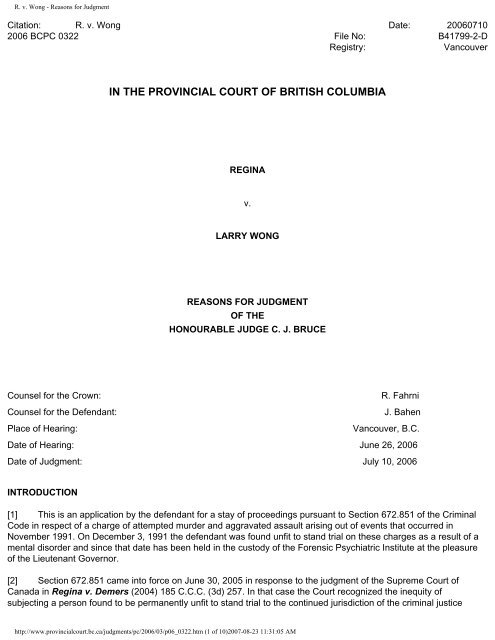
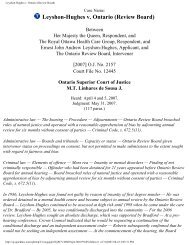
![LaFortune [LaFortunate] (Re) - British Columbia Review Board](https://img.yumpu.com/42779845/1/190x245/lafortune-lafortunate-re-british-columbia-review-board.jpg?quality=85)
